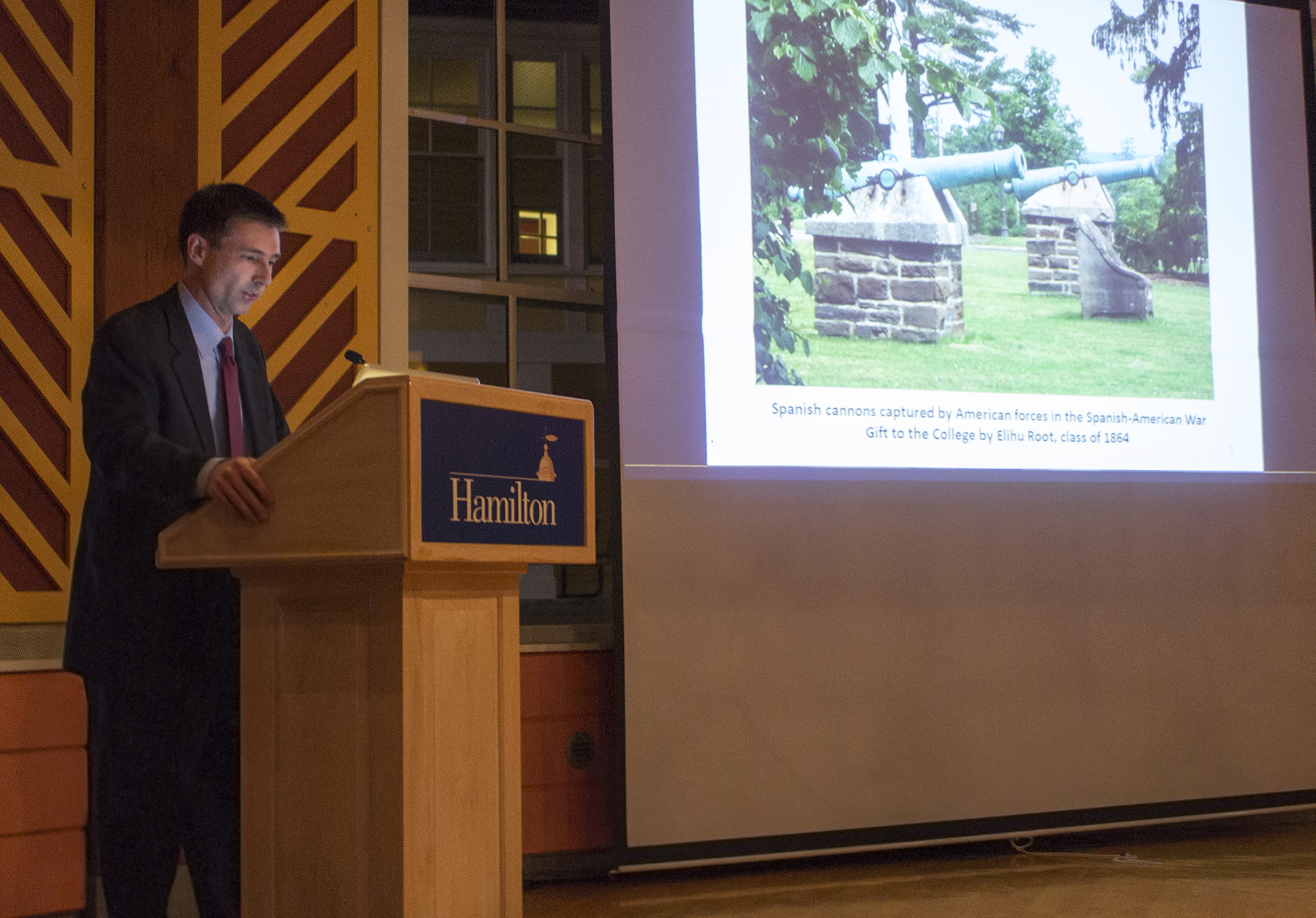
On November 11, 2013, retired Lieutenant General Josiah Bunting III gave a Veteran's Day lecture on leadership during World War II to the Hamilton community.
This year, the second annual Josiah Bunting III Veteran’s Day lecture, presented by the AHI Undergraduate Fellows, was delivered by Lieutenant Colonel Eric Hannis ’90. After graduation from Hamilton, Hannis received his J.D. from the Catholic University School of Law with a specialization in international law. Hannis currently serves as a Lt. Colonel in the U.S. Air Force Reserves, but besides being awarded numerous military awards and distinctions, he has held jobs on Capitol Hill as well as in the Pentagon and private sector.
Hannis began his lecture with the sage advice from former President Theodore Roosevelt, to “work hard at work worth doing.” The Hamilton alumnus reminded the audience that Veteran’s Day is not only about honoring the past, but also looking to the future, and specifically the future of national security in the United States.
When you think about Hamilton, said Hannis, national security and the armed forces are probably not the first thing that comes to mind. However, it is certainly present. “Just look around,” urged Hannis, “it’s all over campus.” Hamilton’s mascot, a Continental Soldier, is dressed in buff and blue, the colors of the New York Continental Army. The tri-corner hat atop the cane given to graduated seniors is homage to Baron von Steuben, drill master of the Continental Army and also the namesake of Hamilton’s Steuben Field.
But Hannis was not here to talk about the monuments that populate Hamilton’s campus, but instead to honor and speak of some of Hamilton’s remarkable veteran alumni who made profound contributions to this country.
He began with the veterans of the Civil War and Captain Morris Brown Jr., class of 1864, a Congressional Medal of Honor recipient due to his action in the Battle of Gettysburg where he lead his company on a flanking counterattack to capture the Confederate flag. Brown, killed in action during the battle of Petersburg Virginia, became the first American to receive the Medal of Honor posthumously. Major Joseph Hawley, class of 1847, was a key player in the abolitionist movement and worked directly with President Lincoln in creating the military strategies employed in the Civil War. There was also Solicitor General Westel Willoughby, class of 1854, who was instrumental in creating Arlington National Cemetery.
Hannis then spoke of Elihu Root, class of 1864, who served as secretary of war from 1899 to 1904. He is credited with the great transformation of the U.S. Army into a modern and powerful force. Moving to the Vietnam War, there was Assistant Secretary of Defense and Pentagon Spokesman Phil Goulding ’42, who acted as the public face of the U.S. government during the conflict. This led to Major General Winant Sidle’38, most famous for acting as chairman on what is known as the “Sidle Commission,” which shaped the way that the media covers military operations even today.
Hannis then moved on to Hamilton veterans of the war on terror, CDR Stephan Foley’84 commanding officer of the U.S. Navy Blue Angels, and Assistant U.S. Attorney General, Randy Moss’83. Moss is credited with being the driving force behind the “Law of Assassination,” which states that the president is authorized to use lethal force to kill an individual enemy of the United States out of self-defense, if he or she presents an imminent threat to the country. This is the law that allowed Presidents Bush and Obama to target terrorists and kill Osama Bin Laden.
As Hannis concluded his speech, he acknowledged that it has been 13 years since there has been an attack on the Pentagon, “but the threat of terror is even more emboldened than it has ever been.” By showing “some Hamiltonians that have done this before,” Hannis hoped that “some of you will decide that a career protecting the national security of your country, and of your fellow Americans, is a career worth doing.”
